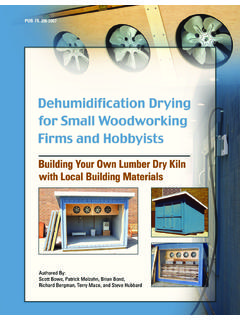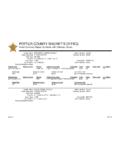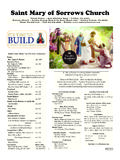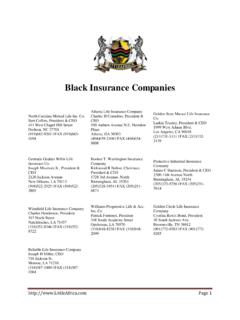Transcription of CONSTITUTIONAL COURT OF SOUTH AFRICA …
1 CONSTITUTIONAL COURT OF SOUTH AFRICA Case CCT 56/13 [2013] ZACC 38 In the matter between: patrick lorenz MARTIN gaertner first Applicant RORY CHARLES KLEMP Second Applicant ORION COLD STORAGE (PTY) LTD Third Applicant and MINISTER OF FINANCE first Respondent COMMISSIONER: SOUTH AFRICAN REVENUE SERVICE Second Respondent CONTROLLER OF CUSTOMS: CAPE TOWN Third Respondent Heard on : 12 September 2013 Decided on : 14 November 2013 JUDGMENT MADLANGA J (Mogoeng CJ, Moseneke DCJ, Cameron J, Froneman J, Jafta J, Mhlantla AJ, Nkabinde J, Skweyiya J, Van der Westhuizen J and Zondo J concurring): MADLANGA J 2 Introduction [1] Kubomvu! 1 is the warning that a lookout would sound on the arrival of police at one or the other of the homes that had the misfortune of being subjected to frequent, warrantless police searches.
2 To the apartheid state the oppressed majority had no privacy to be protected; and no dignity to be respected. Of course, the warning could only be sounded on some of those occasions when the police descended for the searches during the day. Most certainly for effect and possibly heightened indignity, many of the egregious searches were conducted at the dead of night: a time of relaxation; sleep; intimacy; reckless abandon even; and when some, if not most, would be flimsily dressed. The sense of violation and degradation that the victims must have experienced is manifest. Even members of the then dominant race who were viewed as enemies of the state suffered this indignity. It is with this painful history in mind that we consider the CONSTITUTIONAL validity of statutory provisions that authorise searches without warrants.
3 In this case, we do it in the context of the customs and excise [2] The Western Cape High COURT , Cape Town (High COURT ) held that sections 4(4)(a)(i)-(ii), 4(4)(b), 4(5) and 4(6)3 of the Customs and Excise Act4 are 1 Literally, It s red! in the Nguni languages. 2 It must be remembered that the impugned provisions of the Customs and Excise Act 91 of 1964, at the heart of this dispute, date back to 1 January 1965 (this being the date of commencement of the Act) a time when wide powers were conferred upon the police to enter homes without a search warrant at all times to enforce the law of apartheid and to maintain the security of the state .. the Criminal Procedure Act [56 of 1955] was amended to permit any policeman to enter any premises at any time without a warrant.
4 (Emphasis in original.) (Dugard Human Rights and the SOUTH African Legal Order (Princeton University Press, Princeton 1978) 144-5). 3 The text of section 4, inclusive of the High COURT s reading-in, is quoted in [19] below. 4 91 of 1964. MADLANGA J 3 inconsistent with the Constitution and declared them This declaration was ordered not to be retrospective and suspended for a period of 18 months to afford the Legislature an opportunity to make remedial changes. In order not to create a lacuna in the legislative scheme and purpose served by the affected provisions, the High COURT read in certain provisions. [3] The applicants now seek confirmation of the High COURT s declaration of invalidity. Parties [4] Mr gaertner and Mr Klemp, the first and second applicants , are directors of the third applicant, Orion Cold Storage (Pty) Ltd (OCS), which conducts business as an importer and distributor of bulk frozen foods.
5 [5] The first respondent is the Minister of Finance (Minister). He is the minister responsible for the Customs and Excise Act. The second respondent is the Commissioner of the SOUTH African Revenue Service (SARS). The Commissioner administers the Customs and Excise Act. The third respondent is the Controller of Customs: Cape 5 gaertner and Others v Minister of Finance and Others 2013 (4) SA 87 (WCC) (High COURT judgment). 6 I will refer to the second and third respondents collectively as the SARS respondents . MADLANGA J 4 Background facts [6] OCS imports and distributes bulk frozen foodstuffs and holds licences for storage warehouses (also known as customs bonded warehouses or bond stores) in Muizenberg. SARS officials perform routine inspections of OCS s storage warehouses, at most annually, to monitor compliance with the Customs and Excise Act.
6 Past inspections have always been limited to OCS s bond stores and have never extended to OCS s offices or to the homes of OCS s employees or officers. [7] On 21 May 2012 Sloan Valley Dairies Ltd (SVD) of Canada instituted motion proceedings against OCS claiming the return of consignments of skim milk powder sold to OCS, alternatively payment of the purchase price. SVD served a copy of the application on SARS. SARS compared the invoices attached to the application with those that OCS had submitted to SARS for purposes of customs duty. The prices on the SVD invoices were substantially higher than what was reflected on the submission to SARS. This discrepancy led SARS to suspect that OCS had fraudulently manipulated the invoices so as to pay less duty. Consequently, SARS decided to search the premises of OCS.
7 [8] On 30 and 31 May 2012, SARS officials numbering about 40 searched OCS s Muizenberg When they arrived on the first day, they gave Mr gaertner to understand that they were there to conduct a bond inspection8 and he allowed them in. 7 In the interests of brevity, I have lumped the events of the two days together, except where I find it necessary to specify those of a particular day. 8 This is an inspection of the warehouse which forms part of the premises. MADLANGA J 5 It was only after they had sealed the premises that they told Mr gaertner the true reason for their presence. At that point Mr gaertner asked for time to get his attorney to the premises. The attorney not having arrived after 30 minutes, an extensive search ensued. Over the two-day period it included a search of the warehouse; bond store; a safe in the strong room; computers; and the offices of Mr gaertner and Mr Klemp.
8 Mirror images of data on various computers were made and a variety of documents and other objects were seized. [9] As the search was in progress, entry into and exit from the premises was controlled by the SARS officials. People were only allowed out if they agreed to thorough body and vehicle searches. OCS staff were required to stand clear of their computers. Early on during the search an official had warned, if not threatened, Mr gaertner that obstructing a search was an offence and, if necessary, they would call the police for assistance. [10] Through it all, the officials did not have a search warrant. In fact, they told Mr gaertner that they did not need one for a search in terms of section 4 of the Customs and Excise Act.
9 [11] At around 11h00 on 1 June 2012, 14 SARS officials proceeded to Mr gaertner s Constantia home to continue the warrantless search there. Mr gaertner s employee denied them entry until Mr gaertner arrived. They refused to give Mr gaertner reasons for the search and would not tell him what they were MADLANGA J 6 looking for. The officials searched the whole house, including freezers, the ceiling space, the safe, the cellar, garages and storerooms. In the process they went through personal belongings and demanded and got access to the home computers, including those of Mr gaertner s children. During the search, the officials took photographs. [12] On 2 July 2012 the applicants brought an application before the High COURT citing, as respondents, the Minister, the other respondents before this COURT and several SARS officials.
10 They sought declarators that the searches and seizures were unlawful and that section 4 of the Customs and Excise Act is inconsistent with the Constitution and invalid to the extent that it permits targeted, non-routine enforcement searches9 to be conducted without a warrant. They further sought the return of what was seized during the searches. After some initial half-hearted tenders, SARS finally tendered the return of all seized goods and the applicants costs on an attorney and client scale. Despite the actual return of some of the items and the tender of the return of the rest, SARS could not convince the applicants to abandon the application. [13] In their answering affidavits the Minister and SARS took the stance that the question whether section 4 was inconsistent with the Constitution and the lawfulness of the searches were moot as a tender for the return of the seized goods had been made, and the applicants had accepted it.


















